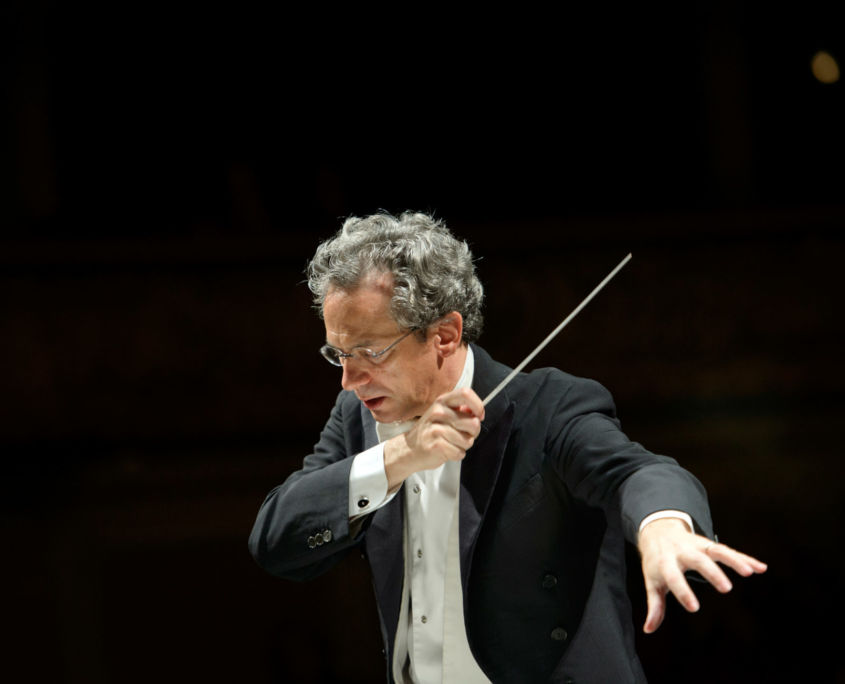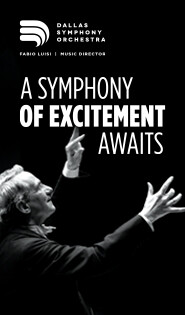Imaginative “Das Rheingold” sets the DSO’s semi-staged Ring cycle in motion

The Dallas Symphony Orchestra’s performance of Das Rheingold on Wednesday served not only as the prelude to Wagner’s mythological epic, Der Ring des Nibelungen, but also the beginning of the ensemble’s complete Ring cycle, to continue through the 2024-2025 season. While ostensibly a concert performance, the event featured limited staged action and imaginative lighting, all of which enhanced the impact of the drama.
Mark Delavan cut a majestic figure as Wotan, his rich basso conveying the god’s full authority. Štefan Margita’s smooth tenor provided a complementary foil as Loge. Delavan and Margita made a particularly effective pair throughout the opera, with Delavan’s conniving Wotan continually looking for gainful schemes from Margita’s equivocal Loge, whose knowing glances to the audience revealed his predilection for mayhem.
Tómas Tómasson’s Alberich began as the comical object of the Rhinemaidens’ derision but quickly took on a menacing tone upon claiming their gold. By the third scene, Alberich’s imperious presence when confronted by Wotan and Loge was transformed to bitter despair at his loss of the ring, conveyed in the malevolence with which Tómasson pronounced his curse upon it.
Deniz Uzun as Fricka provided a second foil for Wotan, putting forth forceful reminders of his bargain with the giants that become increasingly impassioned as her sister Freia’s fate grew more uncertain, while also offering entreaties for Wotan to attend to more domestic matters. Upon learning of Wotan’s plans for her, Ellie Dehn’s Freia alternated between degrees of hope and distress as she helplessly watched Wotan wrangle with the giants before giving in to sorrow as they lead her away.
As the giants, Fasolt and Fafner, Liang Li and Andrew Harris were both formidable presences in dealing with Wotan, but Li inspired genuine pathos in his expressions of longing for Freia, while Harris conveyed a simmering ruthlessness that ultimately boiled over into his killing of Fasolt.
First appearing in the second scene while offering their support for Freia, Jamez McCorkle’s Froh and Hunter Enoch’s Donner both came to the fore in the finale of the opera as they prepared the path to Valhalla. Enoch sternly called forth the thunderstorm in conjunction with the horns, and McCorkle serenely announced the appearance of the rainbow bridge
Playing opposite both the oppressive Alberich and the determined pair of Wotan and Loge, Michael Laurenz as Mime fervently conveyed his character’s misery under the yoke of his increasingly despotic master.
Both dramatically and sonically, the Rhinemaidens – Valentina Farcas, Kimberly Gratland James, and Renée Tatum – formed a seamless unit, their voices blending superbly as they took turns coquettishly taunting Alberich or lamenting the loss of their gold and pleading with Wotan for its return.
In her admonition to Wotan to beware the power of the ring, the Erda of Tamara Mumford at first seemed to exist as a disembodied yet commanding voice; only after a brief moment did one realize that Mumford was actually standing on the orchestra floor at stage right.
The last point calls attention to the ingenious use of space both on and off the stage to suggest the dramatic action. The extreme forward portion of the stage was reserved for the characters to move about and interact to varying degrees, perhaps the most intense example being Delavan’s apparent attempt to physically wrest the ring from the hand of Tómasson. Alberto Triola’s stage direction was further enhanced by novel lighting that further transformed the concert hall into a dramatic space.
The orchestra under Fabio Luisi’s baton was virtually flawless, providing a suitable sonic backdrop for the vocalists while also fulfilling the orchestra’s own narrative role in the work. The sound was very clear and the balance between sections was generally good throughout.
By the closing bars, the entire cast had arranged themselves across the stage such that they could grasp hands and acknowledge the enthusiastic audience with a collective bow. The audience were on their feet immediately, expressing their approval with a standing ovation that continued into the individual curtain calls of the cast members.
Das Rheingold will be repeated 7:30 p.m. Saturday, in alternation with Die Walküre 6 p.m. Thursday and 3 p.m. Sunday. dallassymphony.org
